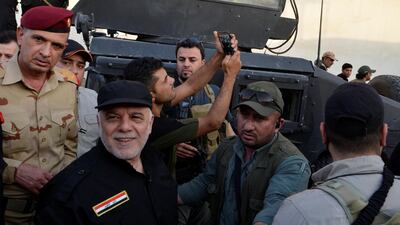The crushing of ISIL in the Iraqi city of Mosul after nine months of intense fighting is a turning point, but history shows that it is dangerous to use the word victory. There have been many victories claimed by the United States in the Middle East that have turned out to be not the beginning of peace but the signal for the start of a new stage in the conflict.
At the end of the first Gulf War in 1991, when Iraqi troops were driven out of Kuwait, George H W Bush declared: “The war is over… It is a victory for the rule of law and for what is right”. In fact, the conflict over who rules Iraq merely moved through different phases, with regular outbursts of fighting ever since.
When the Iraqi prime minister, Haider Al Abadi, announced “total victory” in Mosul on Monday, it was an understandable response to the end of street-by-street combat against an enemy that was willing to shoot fleeing civilians in the back and send women and children to blow themselves up on the front line with Iraqi security forces.
But the question of what victory means hangs over the ruins of the city.
The good news is that the American military, once brimming with confidence about their power to create positive outcomes with armed force, has a new found wisdom. No posters proclaiming “mission accomplished” are being displayed by the Pentagon.
Instead, there is a downbeat assessment of the battle of Mosul’s likely effect on bringing peace and security to Iraq. Lt Gen Stephen Townsend, US commander of coalition forces in Iraq, called on all Iraqis not to allow the conditions that led to the rise of ISIL to recur. This victory, he said, will not eliminate ISIL “and there is still a tough fight ahead.”
These views come from the top. The bookish US defence secretary, Gen James Mattis, said in a rare interview this week: “I do not believe that military issues should lead in foreign policy. I think that’s where diplomats lead and the military then reinforces the diplomats.” America’s historic problem in fighting foreign wars was not lack of firepower but “figuring out what the political end state is.”
The desired end state for Iraq is clear: a state governed by the principle of “functioning federalism” under which provinces would have some control over the spending of the country’s oil wealth. For the Sunni Muslim minority, there is a demand for provincial-level National Guard units in western Iraq as a guarantee that ISIL fighters will not return. For many Iraqi Sunnis, ISIL is a champion against the Shia-dominated Iraqi security forces in case they return as sectarian death squads.
How likely is federalism to come about? Mr Al Abadi is a more consensual figure than his predecessor, Nouri Al Maliki, whose agenda was to entrench the Shia ascendancy. But he is not a powerful figure in himself, and unlikely to be able to push through the concessions to the Sunnis tribes that would give them a stake in modern Iraq, at a time when there is widespread suspicion that pro-ISIL sentiment is indelible in their ranks. If he had unlimited funds, he could do for Mosul what Vladimir Putin did for the city of Grozny, the Chechen capital flattened by the Russian armed forces. At a cost of billions of dollars, Mr Putin rebuilt it as a city of gleaming skyscrapers.
That is not going to happen in Iraq, which has signally failed to rebuild the other cities, such as Ramadi, from which ISIL has been driven out. And of course the extremists are still present in force in Tal Afar and many villages in western Iraq.
For Mr Al Abadi, the challenge is complicated by the fact that Iraq’s problems are not simply the Sunni-Shia divide. Apart from the many divisions inside the Sunni and Shia camps, there is the Kurdish question that is likely to flare up now that the uniting factor of the battle of Mosul has fallen away.
During the ISIL crisis the Kurdish forces took the contested oil city of Kirkuk. Inevitably Baghdad will want to regain control of it, a confrontation that would require a powerful outside force – such as the Americans -- to keep the two sides apart.
The Kurds, who already enjoy wide autonomy in northern Iraq, have raised the stakes by calling an independence referendum in September in defiance of strong opposition from the Baghdad government, Turkey and Iran. This vote may be no more than an attempt to create a false sense of unity among the rival Kurdish parties at a time of economic distress, but it contains the seeds of another war.
Will the US military want to stay and hold the ring between Arabs and Kurds? President Trump’s Iraq playbook focuses on counter-terrorism, rather than nation building so there must be a question mark. The US military would want to know that there is a realistic political end state before committing.
Ultimately Mr Al Abadi’s task is superhuman. He has to reverse the trend of radicalisation on both sides of the Sunni-Shia divide, where both camps feel a growing sense of victimhood and seek protection in the extremes, and moderate voices such as that of Ayatollah Ali Al Sistani, spiritual leader of Iraqi Shia, are drowned out.
When Mr Al Sistani called for a popular mobilisation against ISIL three years ago, he envisaged a nation in arms. He did not intend to endorse the rise of sectarian militias under Iranian control, but that is what took shape. These militias now believe they won the battle of Mosul and want to reap the political rewards.
History does not have to repeat itself but the least one can say is that the environment in Iraq and in the wider Middle East and the mood in Washington suggest that genuine victory is still some way off.

